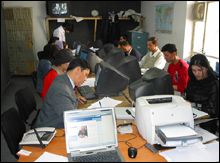
Information Ministry and Council of Ulemas mounts offensive against independent broadcaster
Tolo-TV targeted for showing men and women dancing together
Reading time: (Number of words: )
Yesterday, U.S. president George W. Bush went before a NATO summit, imploring member nations to send more military troops to Afghanistan to "defeat the terrorists." It may be too late. The Afghan government appears to be rife with fundamentalist totalitarians. A young journalist awaits an appeal on his death sentence for possessing documents discussing women in Islam. And now this news about the struggle of Tolo-TV:
Reporters Without Borders is shocked by a campaign being waged by the ministry of information and culture, the lower house of parliament and the Council of Ulemas against privately-owned TV stations, especially Tolo TV, for broadcasting footage of men and women dancing together.
"It is regrettable that, through the ministry of information and culture, the government is supporting a campaign launched by fundamentalists against privately-owned TV stations," the press freedom organisation said. "How does the broadcasting of such images harm Afghan culture?"
Reporters Without Borders added: "We urge information and culture minister Abdulkarim Khoram to take back what he has said and to stop interfering in Afghan television content. We express our full support for Tolo TV, to which we gave an award in 2005 for its commitment to free expression."
The Council of Ulemas and the information and culture ministry announced on 30 March that the broadcasting of some Indian films and TV series, regarded as anti-Islamic, was to be banned by 14 April. The Afghan media received a note (see attached document) from the information and culture ministry supporting these bans. It named three series that TV stations were no longer to broadcast: Kamkam (on the Ariyana television station), Emtahan Zendehghi and Zamane Khosho Ham Haros Bud (on Tolo TV) and Dar Entezar (on Noorin).
The day before, the information and culture ministry issued a release (of which Reporters Without Borders has a copy) condemning a programme the previous day on Tolo TV showing men and women dancing together. This was "against the beliefs and traditions of Afghanistan’s Islamic society," the ministry said. A Tolo TV representative told Reporters Without Borders that in the programme (a re-transmission of the "Afghan Oscars"), most of the women had their heads covered, and that the movements of the dancers were "very restrained."
Tolo TV representatives were summoned to appear before the parliament’s Media Commission on 30 March at the ministry’s request. They argued in their defence that programmes showing dancers were not unusual on Afghan television, including the state TV channel, and that the dance sequence that caused controversy was taken from a film that had been approved by the Afghan film board.
The lower house of parliament (Wolesi Jirga) adopted a resolution yesterday ordering the Afghan media to stop carrying "sensual" images (mobtazal) and saying foreign dancers should no longer be invited to Afghanistan. It also told the media to stop carrying advertising for banks offering loans on which interest is payable. But it postponed the discussion on the proposal to ban all singing and dancing by women on television.
Conservative parliamentarians were very critical of Tolo TV, and former warlord Abdul Rab-Rasoul Sayyaf called for the station to be banned. "Tolo conspires on behalf of foreigners," he said. "I already said this two years ago and no one took me seriously although I provided the government with evidence." Other parliamentarians, including Fawzia Kufi, who represents the province of Badakhshan, condemned these violations of press freedom.
The Council of Ulemas already asked President Hamid Karzai in January to ban Tolo TV and other privately-owned TV stations on the grounds that they were anti-Islamic.
Meanwhile, leading writer and journalist Rahnaward Zaryab appears to have escaped a murder attempt on 29 March when an armed man approaching his home in the Kabul district of Makrooyan was chased away by neighbours.
Two journalists are currently detained in Afghanistan. One is Sayed Perwiz Kambakhsh, now held in Kabul after being sentenced to death by a court in the northern city of Mazar-i-Sharif. The other is Jawed Ahmad, a journalist working for Canadian Television (CTV), who is being held by the US military at Bagram airbase, north of Kabul.

Article from a press release by RSF-Asia

Poems for the Hazara
The Anthology of 125 Internationally Recognized Poets From 68 Countries Dedicated to the Hazara
Order Now








